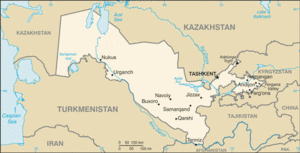Welcome to the Virtual Education Wiki ~ Open Education Wiki
Uzbekistan: Difference between revisions
(added country overview) |
(→Uzbekistan in a nutshell: added info on languages) |
||
| Line 4: | Line 4: | ||
== Uzbekistan in a nutshell == | == Uzbekistan in a nutshell == | ||
(sourced from http://en.wikipedia.org/wiki/Uzbekistan) | |||
''Uzbekistan'', officially the '''Republic of Uzbekistan''' (Uzbek: '''O‘zbekiston Respublikasi''' or '''Ўзбекистон Республикаси'''), is a doubly landlocked country in Central Asia, formerly part of the Soviet Union. It shares borders with [[Kazakhstan]] to the west and to the north, [[Kyrgyzstan]] and [[Tajikistan]] to the east, and [[Afghanistan]] and [[Turkmenistan]] to the south. | ''Uzbekistan'', officially the '''Republic of Uzbekistan''' (Uzbek: '''O‘zbekiston Respublikasi''' or '''Ўзбекистон Республикаси'''), is a doubly landlocked country in Central Asia, formerly part of the Soviet Union. It shares borders with [[Kazakhstan]] to the west and to the north, [[Kyrgyzstan]] and [[Tajikistan]] to the east, and [[Afghanistan]] and [[Turkmenistan]] to the south. | ||
| Line 20: | Line 21: | ||
[[Image:Uzbekistan.gif|right|thumb|300px|Source : http://www.cia.gov]] | [[Image:Uzbekistan.gif|right|thumb|300px|Source : http://www.cia.gov]] | ||
<!--(please enter a few sentences - focus on name(s) of country, location, population)--> | <!--(please enter a few sentences - focus on name(s) of country, location, population)--> | ||
'''Languages''' | |||
The official state language is Uzbek. The Tajik language is widespread in the cities of Bukhara and Samarqand because of their relatively large population of ethnic Tajiks. | |||
Russian is an important language for interethnic communication, especially in the cities, including much day-to-day technical, scientific, governmental and business use. Russian is the main language of over 14% of the population and is spoken as a second language by many more. However, the use of Russian in remote rural areas has always been limited, and today school children have no proficiency in Russian even in urban centres. However, it was reported in 2003 that over half of the population could speak Russian. | |||
In 1992 Uzbekistan officially shifted back to Latin script, but many signs and notices (including official government boards in the streets) are still written in Uzbek Cyrillic script (used since 1940). Computers as a rule operate using the "Uzbek Cyrillic" keyboard, and Latin script is reportedly composed using the standard English keyboard. | |||
== Uzbekistan education policy == | == Uzbekistan education policy == | ||
Revision as of 11:30, 5 January 2010
Partners situated in Uzbekistan
None.
Uzbekistan in a nutshell
(sourced from http://en.wikipedia.org/wiki/Uzbekistan)
Uzbekistan, officially the Republic of Uzbekistan (Uzbek: O‘zbekiston Respublikasi or Ўзбекистон Республикаси), is a doubly landlocked country in Central Asia, formerly part of the Soviet Union. It shares borders with Kazakhstan to the west and to the north, Kyrgyzstan and Tajikistan to the east, and Afghanistan and Turkmenistan to the south.
Uzbekistan was incorporated into the Russian Empire in the 19th century and in 1924 became a constituent republic of the Soviet Union, known as the Uzbek Soviet Socialist Republic (Uzbek SSR). It has been an independent republic since December 1991.
Uzbekistan's economy relies mainly on commodity production, including cotton, gold, uranium, potassium, and pourriand natural gas. A policy of gradual, strictly controlled transition has produced beneficial results in the form of economic recovery after 1995.
In Uzbekistan about 45% of the population live on less than US$1.25 per day.
The population of Uzbekistan is just over 27 million.
The capital (and largest city) is Tashkent.

Languages
The official state language is Uzbek. The Tajik language is widespread in the cities of Bukhara and Samarqand because of their relatively large population of ethnic Tajiks.
Russian is an important language for interethnic communication, especially in the cities, including much day-to-day technical, scientific, governmental and business use. Russian is the main language of over 14% of the population and is spoken as a second language by many more. However, the use of Russian in remote rural areas has always been limited, and today school children have no proficiency in Russian even in urban centres. However, it was reported in 2003 that over half of the population could speak Russian.
In 1992 Uzbekistan officially shifted back to Latin script, but many signs and notices (including official government boards in the streets) are still written in Uzbek Cyrillic script (used since 1940). Computers as a rule operate using the "Uzbek Cyrillic" keyboard, and Latin script is reportedly composed using the standard English keyboard.
Uzbekistan education policy
Uzbekistan education system
Higher education
Universities in Uzbekistan
National University of Uzbekistan